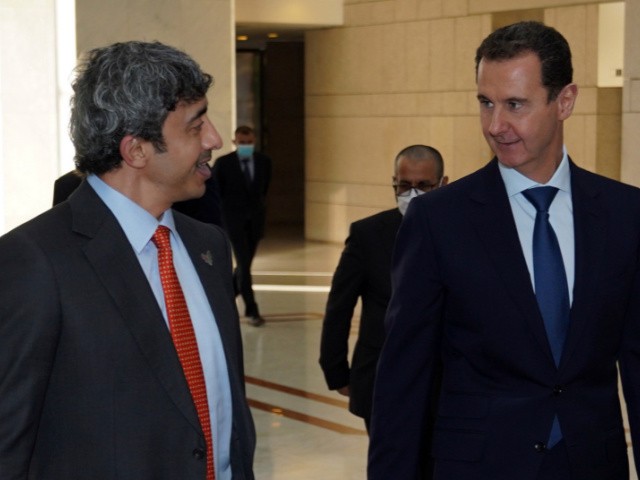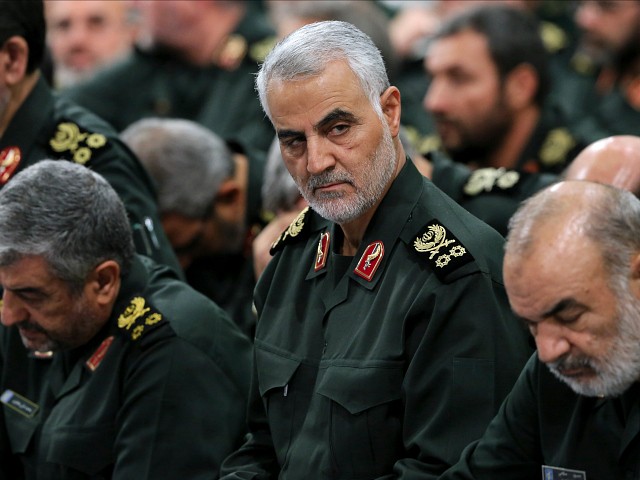Saudi outlets reported on Wednesday, citing anonymous sources within Syria, that the nation’s dictator, Bashar al-Assad, had expelled Iranian Quds Force Commander Mustafa Javad Ghaffari from the country after the terror chief attempted to create a black market in Syria and needlessly inflamed tensions with the country’s neighbors.
The Quds Force is the foreign terrorist unit of the Iranian Islamic Revolutionary Guard Corps (IRGC), itself a U.S.-designated terrorist organization and a formal wing of the Iranian military. The Quds Force has been in relative disarray since then-President Donald Trump ordered a drone strike to take out its leader, Qasem Soleimani, in early 2020. Ghaffari is believed to have been Soleimani’s “right-hand man” and played a key role in helping Assad commit mass atrocities against civilians to remain in power during the Syrian Civil War. Under Soleimani, no reports indicated tensions between longtime allies, Iran and Syria.
The Saudi outlets, reportedly, did not note what role, if any, Soleimani’s replacement, Esmail Qaani, played in the alleged tensions between the two countries.
The Times of Israel, translating reports in Saudi Arabia’s al-Arabiya network and from broadcaster al-Hadath, reported that Assad had formally requested Tehran remove Ghaffari from the country in response to “a major breach of Syrian sovereignty at all levels.” Among Ghaffari’s alleged transgressions were the placement of troops in areas that Assad had explicitly forbidden Iranian terror soldiers and the development of a black market against Assad’s wishes, the newspaper relayed.
The newspaper quoted the al-Hadath report as stating that Assad felt Ghaffari’s troop movements against America and Israel “almost led to the entry of Syria into an unwanted regional war, including the attack on American targets in Syria on October 20 by Iranian-backed militias.” The attack in question reportedly caused no casualties.
“Ghafari admitted the presence of Iranian elements and weapons in the areas where the Syrian regime prohibited their deployment,” the Saudi outlets reported. The commander also allegedly “transgressed Syrian customs and smuggled goods with the aim of creating a ‘black market,’ which constitutes a challenge and competition to the Syrian market” and engaged in “looting economic resources” away from an already beleaguered Syrian economy.
The Times of Israel, citing the Saudi outlets, also accused Ghaffari of tax evasion.
Israel Hayom, another Israeli outlet translating the Saudi reports, said that the Arabic-language al-Arabiya coverage of the rift noted a “negative trend” in Iranian-Syrian relations had culminated in Assad expelling the commander and that it was not an isolated incident or personality clash with Ghaffari alone.
Saudi Arabia has a vested interest in the collapse of relations between Iran and Syria, as Iran’s most formidable rival on the world stage. As a serial and unapologetic, anti-American human rights abuser, Assad endured a decade as a global pariah. The administration of former President Barack Obama and his allies largely isolated Assad – after heralding him as a “reformer” – in an attempt to help mostly Sunni Muslim rebels overthrow his Shiite regime. Assad survived and won the Syrian Civil War after a decade with the help of Iran and Syria, crushing civilian rebel strongholds with chemical weapons.
Assad’s resilience prompted Sunni Saudi Arabia to seek normalized relations with his regime in June, according to Qatari outlet al-Jazeera.
“The political mood within the House of Saud has changed, many senior royals, particularly [Crown Prince] Mohammad bin Salman [MBS] himself, are keen to reengage with Assad,” an unnamed former Syrian opposition leader told the network. “The prevailing attitude can be defined as, ‘times have changed, the Arab Spring is history and the region is transitioning towards a new future, with new geopolitical characteristics.'”
Engaging with Saudi Arabia would potentially require cutting ties with Iran for Assad. The dictator has increasingly exhibited a desire to rehabilitate his public persona and expand his alliance, potentially at Iran’s expense. While previously only counting on rogue regimes for support – Iran, Russia, Cuba, Venezuela, and North Korea paramount among them – Assad’s regime has touted growing communication with the government of the United Arab Emirates (UAE), a key Saudi and American ally.
Assad welcomed Emirati Foreign Minister Sheikh Abdullah bin Zayed, the nation’s top diplomat, for talks in Damascus on Tuesday, according to Reuters. The outlet, citing Assad’s office, said the two “discussed ‘exploring new horizons’ for cooperation.” Assad’s Syrian Arab News Agency (SANA), a regime propaganda outlet, boasted of the arrival of a new consul-general to its office in Dubai this week:

In this photo released by the Syrian official news agency SANA, shows Syrian President Bashar Assad, right, speaks with Sheikh Abdullah bin Zayed Al Nahyan, the Foreign Minister of the United Arab Emirates, in Damascus, Syria, Tuesday, Nov. 9, 2021 (SANA via AP).
SANA also publicized the Assad regime’s participation in UNESCO, the United Nations cultural preservation agency, an indication that the international community sees the Assad regime as a legitimate partner.
The administration of President Joe Biden, who served as vice president when Obama failed to enforce his so-called chemical weapons “red line” against Assad, scolded the UAE government over the reports.
“We are concerned by reports of this meeting and the signal it sends,” State Department spokesman Ned Price said this week. “As we’ve said before, this administration will not express any support for efforts to normalize or to rehabilitate Bashar al-Assad who is a brutal dictator.”




Post a Comment